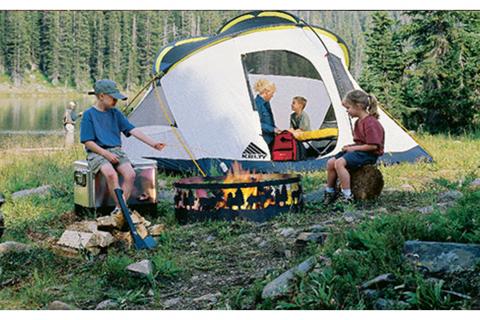
With camping, as with so many other activities in life, unspoken rules of etiquette apply, especially when you’re sharing the great outdoors with others in a developed campground.
The bottom line of campground etiquette: consideration of others at all times. Keep that in mind, and both you and those around you will have an enhanced experience.
A few tips:
• Perhaps the biggest faux pas you can make at a campground is rinsing your dishes or gutting a fish under a communal faucet. That’s a huge no-no that will garner dirty looks and mark you either as ignorant, or as a rude and inconsiderate camper. Food scraps caught in a drain will attract raccoons, bears and other critters. The proper method: Scrape your pots and plates into a garbage bag before washing with biodegradable soap. After scrubbing, strain your dishwater to dispose of any remaining scraps. Dump wash and rinse water in your fire pit, or well away from any campsites.
• Clean fish at designated sites or far from spots frequented by other anglers. Pack out the guts and dispose of them in appropriate dumpsters.
• Don’t cut through occupied campsites on your way to restrooms or other facilities. Respect the invisible boundaries and go around.
• Minimize nighttime light and noise. Whether you arrive late or have to put something in your vehicle after dark, don’t talk loudly or slam doors. Use a lantern, rather than your headlights, while setting up your tent. Tents are not soundproof, and neither are they light-proof. When walking around at night, point your flashlight or headlamp at the ground, not toward other peoples’ tents or tables. Keep voices to a whisper after 10 p.m.
• The newest source of frequent complaints in RV campgrounds? Outdoor TVs. If football is really that important, please watch it indoors.
• Your dog might be your best friend, but she’s not your neighbor’s best friend. Keep barking to a minimum, don’t let Rover roam free and always, always, pick up after your pet.
• Keep a clean and tidy campsite. Food and scraps left out on your table invite critters that will investigate neighboring campsites, too.
• Watch your speed on campground roads, and expect to encounter kids and adults at every juncture.
• Leave no trace. If previous campers left bottle caps and bits of foil or trash in the fire pit or scattered around the site, pick them up and properly dispose of them. Pay it forward by leaving the site cleaner than you found it, and the next campers will be encouraged to do the same.
- 1616 views

